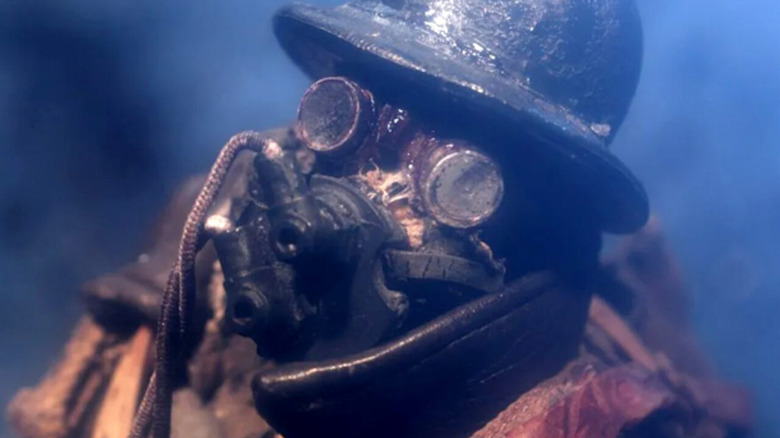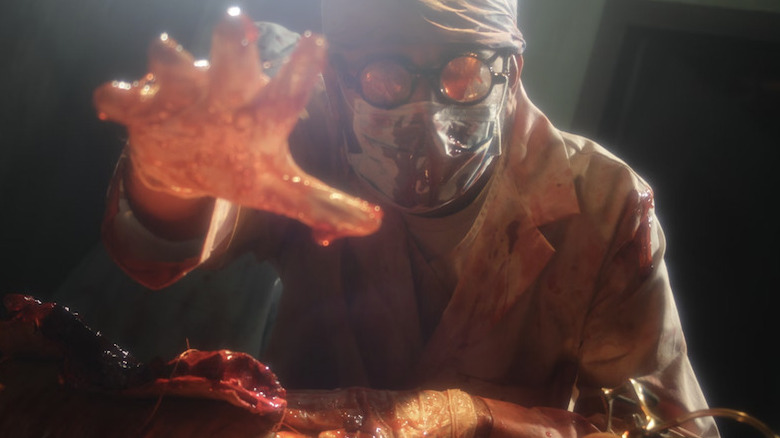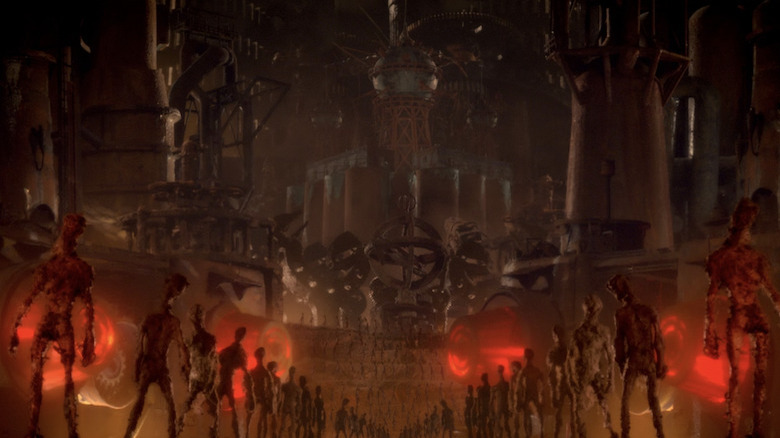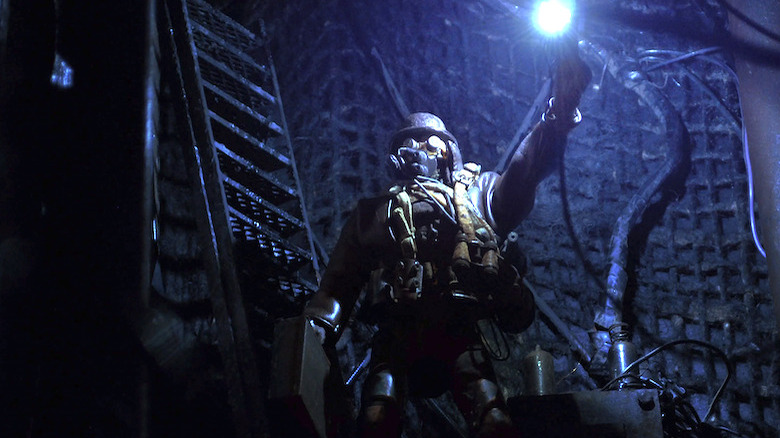Phil Tippett's Mad God Is The Perfect Movie For The Moment
When thinking about the best practical effects in cinema, there are a few movies that instantly come to mind, like "Star Wars," "The Terminator," "RoboCop," and "Jurassic Park." As the years have gone by, CGI has improved in leaps and bounds. Now it's not just dinosaurs or aliens that are created by computers, but studios also love to dish out de-aging technology to bring younger versions of characters (like the young and semi-digital Luke Skywalker) back to the screen.
As great as CGI is, though, there's something truly beautiful about the practical effects that go into creating some of the most iconic cinematic worlds of the past. And when it comes to these hands-on visual effects, Oscar winner Phil Tippett is arguably one of the most iconic producers of all-time, having won Academy awards for his work on Star Wars: Episode VI – Return of the Jedi" as well as "Jurassic Park" (per IMDb). Tippett also used his talents for "RoboCop," and "Starship Troopers."
As it turns out, Tippett has been working on his own passion project for over 30 years, "Mad God," a stop-motion film has finally been released in June 2022. "Mad God" follows an unnamed Assassin who dives into the murkiest depths of a depraved reality to carry out an apocalyptic mission, which quickly goes awry as he comes across hideously deformed monsters and millions of tortured citizens who are brutalized in the most horrific ways. It's a horror masterpiece — although it doesn't rely on jump scares to terrify the audience. Instead, it offers something deeper. Because under the gorgeously animated violence in "Mad God" is a timely parable about the horrors of a never-ending war, which brilliantly embodies the fears of our era in a frenzy of stop-motion glory.
The Assassin and his enemies are just puppets
Warning: Spoilers for "Mad God" ahead!
What's initially quite startling about the film is that there's next-to-no dialogue at all, which only makes the violence all the more disturbing. In fact, the lack of discussion forces the audience to look deeper into the events unfolding on screen, and it quickly becomes clear that the Assassin is a puppet for his master, known only as the Last Man. As soon as the gas mask-wearing protagonist arrives in the first realm, he struggles to avoid disturbing creatures and monsters whose sole purpose is to rip, shred, and obliterate anything that moves.
But as he gets further down the rabbit hole, it becomes very clear that the respective ruling figures both above and below are just puppeteering their own forces. The Last Man is sending the Assassin on a near-impossible mission with an explosive briefcase, while the Alchemist controls the hordes of monsters in the hopes of creating a new reality of pain. Everyone in-between is caught in the crossfire ... but the generals sit cozy, away from the fighting. It's hard not to recognize the very real version of this in the present day, as world leaders squabble and lead wars that ordinary people are forced to endure.
In fact, there's a particular sequence where monstrous overseers send innocent creatures to be bulldozed and eviscerated in a factory-like world as they become fuel for endless war machines. Their lives mean absolutely nothing, all they are is just fodder for this world's military industrial complex — a notion which feels all too familiar when looking at world events of the last two decades. After all, the United States has spent $6.4 trillion on various forever wars in the Middle East post-9/11 (via Global Times).
Mad God's different worlds feel particularly relevant right now
Over the course of the 80-minute-long movie, the Assassin (and his successor) journey through several different worlds, descending through each one via hatches and tunnels — much like Dante's descent through the Nine Circles of Hell. But each reality sees warring factions trying to annihilate each other with varying degrees of brutality. Whether it's the mutant creatures preying on the weaker lifeforms at the start of the film, or the explosive warzone introduced shortly before the end of the story, the message is simple — a never-ending war leads to a bleak ending for humanity.
This feels particularly relevant when considering the current events in Ukraine — as the conflict continues to rage on after Russia invaded the country in February 2022 (per CNBC). Tensions have been high between the two nations for years, most notably because Russia annexed Crimea from Ukraine back in 2014. And while no, obviously "Mad God" isn't a reaction to the current conflicts — remember how long ago he started working on it? — it says a lot about the state of the world that its anti-war message still rings true when Tippett has been working on the film for over 30 years.
War never changes, but there is hope
To borrow a line from the "Fallout" video games, "War never changes." And that same notion is very clear in the cyclical nature of the ending of "Mad God."
The best science fiction stories are always the ones that tell a human story in the middle of a fantastical setting, and "Mad God" is no different. As much as it's about the death and destruction brought on by war, it's also about the people striving to do the right thing in the face of something truly horrifying. Even though the Assassin meets a gruesome end at the hands of the enemy, he's succeeded by a New Assassin — who survives different worlds with ease. Is he the key to saving everything? His disappearance is the most hopeful note of the entire film, as he sets out to finish the job that his predecessor couldn't complete.
In reality, the perfect example of hope in a dire situation is embodied by the fact that the entire world continues to support Ukrainian refugees as they flee the conflict — with many nations opening their doors to help the ones most affected by the situation. But while "Mad God" has the New Assassin survive the events of his stop-motion hell, this is Phil Tippett's visceral proposal to the world: the powers-that-be must stop pushing us further into oblivion, or they risk the rest of the world. Sure, it might not be the cheeriest of endings, but it speaks truth to the conflicts of the present-day, and the film is certainly a sight to behold.



